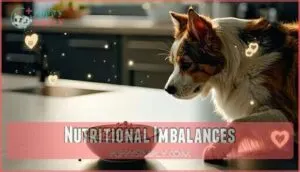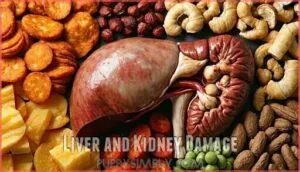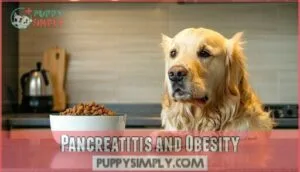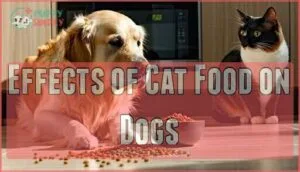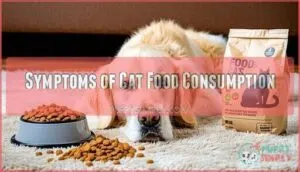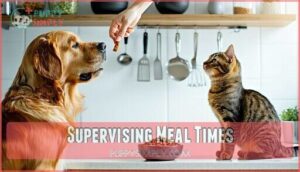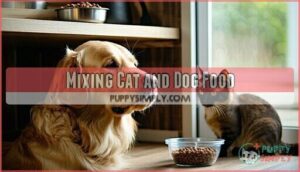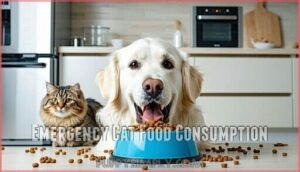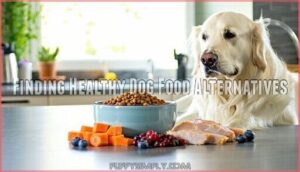This site is supported by our readers. We may earn a commission, at no cost to you, if you purchase through links.
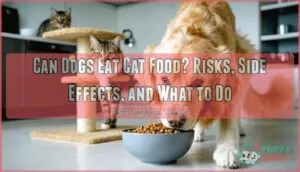
Cat food is packed with protein and fat made for a cat’s needs, not a dog’s, and too much of it can upset your pup’s stomach.
In the long run, it may cause problems like obesity, pancreatitis, or even kidney issues.
Think of it like swapping out your breakfast cereal for cake—sure, it tastes great, but it’s not exactly balanced.
If your dog sneaks a bowl, keep an eye out for vomiting or discomfort.
Wondering how to keep meals separate? We’ve got tips ahead.
Table Of Contents
- Key Takeaways
- Cat Food Vs Dog Food
- Can Dogs Eat Cat Food
- Health Risks for Dogs
- Effects of Cat Food on Dogs
- Symptoms of Cat Food Consumption
- Preventing Cross Feeding
- Mixing Cat and Dog Food
- Emergency Cat Food Consumption
- Finding Healthy Dog Food Alternatives
- Frequently Asked Questions (FAQs)
- What to do if my dog will only eat cat food?
- Why is cat food good for dogs?
- How often can dogs safely eat cat food?
- Are there any differences in the nutritional requirements between dogs and cats?
- Can puppies safely eat cat food occasionally?
- How does cat food affect senior dogs?
- Are there behavioral changes linked to eating cat food?
- How quickly does cat food affect digestion in dogs?
- Conclusion
Key Takeaways
- Dogs can nibble on cat food occasionally, but it’s too rich in protein and fat for daily meals and may cause health problems like obesity or pancreatitis.
- Cat food lacks the balance dogs need, so long-term consumption can lead to nutritional deficiencies and strain on their organs.
- Keep meals separate to prevent cross-feeding; train pets and use barriers, elevated feeders, or timed feeding devices.
- If your dog eats cat food, watch for signs like vomiting or lethargy, and consult a vet if symptoms persist or worsen.
Cat Food Vs Dog Food
Cat food and dog food might look similar, but they’re built for completely different nutritional needs.
While cats are strict carnivores with high protein demands, dogs thrive on a more balanced mix of meat and plants.
Nutritional Differences
Cats and dogs aren’t cut from the same cloth in terms of food.
Cats, being obligate carnivores, thrive on meat, while dogs, as omnivores, need variety.
Cats are meat-loving carnivores, while dogs, as omnivores, need a diverse mix to stay healthy.
This nutritional difference drives key contrasts in their diets.
Here’s a quick breakdown:
| Aspect | Cats | Dogs |
|---|---|---|
| Protein Needs | Minimum 26% | Minimum 18% |
| Fat Content | At least 9% | At least 5.5% |
| Amino Acids | Needs 11 (e.g., taurine) | Needs 10 |
| Vitamin A Needs | Higher | Lower |
Protein and Fat Content
You might’ve noticed your dog sneaking a taste of cat food.
Here’s the scoop: cat food is loaded with protein and fat to meet a cat’s carnivorous needs, but it’s too rich for dogs.
The high calorie density and ingredient sources can overwhelm a dog’s system, leading to potential health risks.
Check out the comparison:
| Nutrient | Cat Food | Dog Food | Impact on Dogs |
|---|---|---|---|
| Protein Levels | 26%+ | 18%+ | Strains kidneys, liver |
| Fat Content | 9%+ | 5.5%+ | Weight gain, pancreatitis |
| Calorie Density | High | Moderate | Overload, obesity risks |
| Digestibility | Cat-optimized | Dog-optimized | Trouble processing nutrients |
Amino Acids and Vitamins
Cats need taurine and arachidonic acid to thrive, but dogs aren’t built to handle those high levels.
A lack of taurine can hurt your cat, but Vitamin A toxicity is a risk for dogs.
Cat food meets carnivore requirements with essential amino acids and vitamins, yet dogs can’t synthesize these effectively.
Here’s a quick comparison:
| Nutrient | Cats Require | Dogs Require |
|---|---|---|
| Taurine | Essential | Not Essential |
| Vitamin A | Preformed (from meat) | Converted (plant-based) |
| Arachidonic Acid | Essential | Synthesized in body |
| Protein Level | High (26% or more) | Moderate (18% or more) |
| Fat Content | High (9% or more) | Lower (5.5% or more) |
Can Dogs Eat Cat Food
It might seem harmless if your dog sneaks a bite of cat food, but it’s not ideal for their health.
Dogs and cats have very different dietary needs, and cat food, while tempting, doesn’t meet dog dietary needs.
Cat food’s high protein and fat content may cause digestive sensitivities or food allergies in some dogs.
Over time, the nutritional deficiencies from an unbalanced diet could lead to long-term effects, like poor overall health.
Certain breeds with predispositions to obesity or pancreatitis are especially at risk.
So, is cat food bad for dogs? For occasional nibbles, the answer is "not immediately,” but as a regular part of their diet, it’s a no-go.
Dog food vs cat food—dogs simply need a balanced plan.
Health Risks for Dogs
Feeding your dog cat food might seem harmless at first, but it can lead to some serious health risks over time.
Feeding your dog cat food may seem harmless, but it poses hidden health risks that can impact their well-being over time.
From nutritional imbalances to organ damage, the consequences are often more severe than you’d expect, with serious health risks being a significant concern.
Nutritional Imbalances
Feeding your dog cat food occasionally might seem harmless, but over time, it can mess with their health.
Dogs need nutrients designed for their bodies.
Here’s what goes awry:
- Excess Vitamin A hurts the liver.
- Taurine Deficiency weakens hearts.
- Mineral Imbalances zap energy.
- Fiber Deficiency upsets digestion.
- Amino-Acid Deficit harms muscles.
Stick to dog dietary needs!
Liver and Kidney Damage
A steady diet of cat food can strain your dog’s kidneys, cause liver inflammation, and aggravate pre-existing conditions like kidney or liver disease.
Protein overload from cat food’s high levels can harm pet kidney health or liver health over time.
To compare risks, here’s a quick breakdown:
| Risk | Cause | Effect | Severity |
|---|---|---|---|
| Kidney Strain | Excess Protein | Kidney Damage | High |
| Liver Inflammation | High Fats | Liver Disease | Moderate |
| Long-Term Effects | Nutrient Imbalance | Organ Failure | Severe |
| Pre-existing Conditions | Cat Food Toxic | Worsens Health | Severe |
The key risks associated with feeding cat food to dogs include kidney strain, liver inflammation, and long-term effects that can lead to organ failure and worsen pre-existing conditions.
Pancreatitis and Obesity
Some dogs, especially breeds prone to pancreatitis like Schnauzers, can’t handle the high dietary fat in cat food.
Regularly eating it may lead to pancreatitis, obesity, and insulin resistance, wreaking havoc on dog health.
Weight management through proper diet, exercise, and balanced nutrients is essential.
Can dogs have cat food occasionally? Sure, but it’s a slippery slope to health troubles.
Effects of Cat Food on Dogs
When your dog sneaks a bite of cat food, it might seem harmless, but the effects can quickly add up.
From upset stomachs to weight gain, cat food’s high protein and fat content isn’t ideal for your pup’s health.
Gastrointestinal Upset
Gastrointestinal upset is a common problem when your dog eats cat food.
The high protein and fat content can throw your pup’s gut bacteria off balance, leading to vomiting or diarrhea.
Food sensitivities and enzyme deficiencies might also play a role, especially in picky eaters.
Keeping hydration levels up is key to maintaining dog health after these dietary indiscretions.
Weight Gain and Diabetes
It’s not just a snack—cat food for dogs can lead to obesity and diabetes due to its high calorie and fat content.
Watch for these risks:
- Obesity risks from excessive calorie intake.
- Insulin resistance over time.
- Dietary management becomes tougher as weight increases.
- Lack of exercise impact worsens the issue.
- Certain breeds face higher diabetes predisposition.
Balance is key!
Joint Strain and Poor Heart Health
Excess calories in cat food can lead to obesity, putting extra strain on your dog’s joints and mobility.
Overweight pups often face joint degradation, limited mobility, and even painful arthritis. Plus, the long-term effects of high-fat cat food include cardiac complications, like poor heart health.
Dietary management is key to avoiding cat food dangers and keeping your dog healthy, and it is crucial for preventing obesity.
Symptoms of Cat Food Consumption
When your dog sneaks a bite of cat food, you might notice symptoms like vomiting, diarrhea, or general discomfort.
While not always serious, these signs can indicate their body isn’t handling the rich, high-fat diet well.
Vomiting and Diarrhea
If your dog sneaks some cat food, it could trigger vomiting or diarrhea, thanks to dietary causes like high protein and fat levels.
Symptom severity depends on their digestive tolerance, while occasional trouble isn’t severe, dehydration risks can arise.
Offer water, try bland home remedies, and watch for improvement, if gastrointestinal distress persists, seek veterinary intervention to safeguard your pet’s health.
Discomfort and Lethargy
If your dog ate cat food, watch for signs like lethargy or discomfort.
Causes of lethargy include high protein or fat overload from cat food, leading to gastrointestinal upset.
Recognizing discomfort early can prevent worse issues like pancreatitis.
Monitor severity timelines; if symptoms persist, seek veterinary intervention.
Home care helps, but long-term effects demand caution to avoid future trouble, considering the potential for gastrointestinal upset.
High Temperature and Abdominal Pain
If your dog ate cat food, watch for fever symptoms and abdominal tenderness.
Pain severity can hint at pancreatitis, a serious condition. A high temperature and discomfort might signal gastrointestinal upset affecting pet gastrointestinal health.
Seek a veterinary diagnosis promptly. Treatment options vary, but quick action helps avoid complications.
Remember, high-fat cat food isn’t worth risking your dog’s health.
Preventing Cross Feeding
You can stop your dog from sneaking cat food by setting clear mealtime boundaries for each pet.
Creating separate feeding areas and supervising meals makes it easier to prevent cross-feeding mishaps, which helps to establish clear boundaries and routines for your pets.
Managing Multi Pet Households
Managing a multi-pet household can feel like juggling balls, but it’s doable. Stick to these tips:
- Use training techniques to teach pets boundaries around feeding times.
- Store pet food securely to control access and prevent sneaky snacks.
- Consider breed differences when setting rules—some pets need extra supervision.
Properly storing food can prevent issues such as unwanted pet access. A little structure goes a long way in reducing chaos and keeping everyone happy, with clear rules and proper storage being key to a harmonious multi-pet household.
Using Separate Feeding Areas
In multipet households, creating separate feeding areas can prevent chaos and cross-feeding.
Use designated spaces, like a quiet room or elevated feeders, to guarantee pet dietary needs are met.
Microchip or puzzle feeders add an extra layer of control, this setup makes meal times peaceful, so you won’t worry about, “Can dogs eat cat food?”—avoid the hassle entirely with separate feeding areas.
Supervising Meal Times
Constant supervision during timed meals keeps your pets from swapping bowls.
In multipet households, restricting access with elevated feeders or barriers helps maintain separate feeding areas.
Letting your dog eat cat food regularly isn’t healthy, so stay vigilant. Consider automatic pet feeding to manage portions.
Think of mealtime as a team sport—keeping everyone in their lane guarantees balanced diets and fewer tummy troubles for your furry family members.
Mixing Cat and Dog Food
Mixing cat food with dog food might seem like a quick fix for picky eaters, but it’s not the best idea.
Cats and dogs have very different nutritional needs, so combining their foods can lead to health issues over time.
Picky Eating in Dogs
When your dog’s picky eating becomes a problem, it’s often linked to underlying causes like behavioral issues, food preferences, or nutritional deficiencies.
Pet dietary habits, such as holding out for tastier food, can worsen over time.
Stick to consistent pet dietary choices—don’t offer cat food as a shortcut, and for persistent pet appetite changes, seek veterinary advice to find lasting solutions.
Veterinary Consultation
If picky eating persists or your dog sneaks cat food, it’s time to seek veterinary advice.
Sometimes, breeds have unique diet sensitivities or underlying conditions that impact food choices.
Consult a vet to address concerns like these:
- Symptom severity: Monitor vomiting, lethargy, or weight gain.
- Breed predispositions: Certain breeds require stricter diets.
- Preventative advice: Guarantee balanced pet health with expert insights.
Emergency Cat Food Consumption
If your dog just ate cat food, don’t panic—it’s not immediately dangerous in most cases.
However, you’ll want to watch for any unusual symptoms and be ready to call your vet if needed.
What to Do if Your Dog Eats Cat Food
Wondering what to do if your dog snacks on cat food? First, don’t panic.
Skip their next meal to avoid overloading their stomach. Monitor symptoms like vomiting or diarrhea, and keep your dog hydrated.
Offer a bland diet afterward, and consider giving probiotics to help digestion. If symptoms persist, a vet visit is essential to rule out cat food poisoning or pancreatitis.
| Step | Action |
|---|---|
| Monitor Symptoms | Watch for vomiting, diarrhea, or lethargy. |
| Hydration Guidance | Encourage water intake for recovery. |
| Bland Diet | Provide plain chicken or rice. |
| Probiotics Help | Support digestion with probiotics. |
| Vet Visit | Seek veterinary advice if needed. |
Monitoring for Symptoms
If your dog gets into occasional cat food, monitoring symptoms is key.
Watch for signs like:
- Lethargy Watch: Is your dog unusually tired or sluggish?
- Appetite Changes: Notice decreased interest in meals?
- Stool Consistency: Look for loose or unusually hard stools.
- Vomiting Frequency: Pay attention to repeated episodes.
- Abdominal Tenderness: Check for discomfort when touching their belly.
When in doubt, seek a veterinary consultation.
Seeking Veterinary Attention
If you notice urgent symptoms like vomiting or discomfort after your dog eats cat food, a quick vet visit is essential.
Persistent issues might indicate cat food poisoning in dogs.
Schedule professional advice to address dietary emergencies or necessary dietary changes.
Use this table for clarity:
| Concern | Action |
|---|---|
| Vomiting | Visit vet immediately |
| Lethargy | Seek veterinary care |
| Abdominal pain | Consult with a vet |
| Diet adjustments | Follow vet advice |
| Preventative care | Monitor meals closely |
Finding Healthy Dog Food Alternatives
In terms of feeding your dog, it’s important to pick food that meets their specific nutritional needs.
Don’t worry—there are plenty of healthy and balanced options to keep them happy and healthy without resorting to cat food.
Looking for Balanced Nutrition
Instead of wondering, “Can dogs eat cat food?” focus on dog nutrition by checking food labels for balanced recipes.
Look for brands that prioritize ingredient quality and align with dietary guidelines. Nutritional differences matter—cat food ingredients lack key nutrients for dogs.
Understanding dog food formulations is vital for healthy health.
Proper pet nutrition ensures better nutrient absorption, so choose high-quality food designed for your dog’s needs to keep them thriving, focusing on balanced recipes.
Consulting With Your Vet
Reaching out to your vet is always wise when exploring pet dietary recommendations.
They’ll tailor advice based on your dog’s breed predispositions, current health, and dietary concerns.
Whether it’s managing symptom severity or planning preventative measures, a veterinarian’s advice guarantees your furry friend stays healthy.
Follow-up care helps catch issues early, so never hesitate to ask, “Can dogs eat cat food?” and consider the importance of a veterinarian’s advice to keep your dog healthy.
Avoiding Cat Food Substitutes
To keep your dog healthy, focus on safe alternatives that meet their nutritional needs.
Cat food’s higher protein can cause pet dietary imbalances, even pancreatitis.
Reading labels helps guarantee proper ingredient awareness, avoiding cat food toxic to dogs.
Stick with dog-specific diets, as cat food safe for dogs occasionally may still trigger issues like cat food poisoning or obesity.
Frequently Asked Questions (FAQs)
What to do if my dog will only eat cat food?
Gradually switch your dog to high-quality dog food by mixing small amounts with the cat food they prefer.
Offer praise for eating dog food, and consult your vet if the picky behavior continues.
Why is cat food good for dogs?
It might seem like dogs love sneaking cat food, but it’s not actually good for them.
Cat food’s higher fat and protein can upset a dog’s stomach, lead to obesity, and cause serious health issues over time.
How often can dogs safely eat cat food?
Dogs can eat cat food occasionally without harm, but it’s not a good habit.
Cat food’s high protein and fat levels can upset their stomach or cause long-term issues like obesity or pancreatitis if overdone.
Are there any differences in the nutritional requirements between dogs and cats?
They say variety is the spice of life, but cats and dogs need distinctly different diets.
Cats crave high protein and fat as obligate carnivores, while dogs thrive as omnivores needing balanced meat and plant nutrients.
Can puppies safely eat cat food occasionally?
It’s not safe for puppies to eat cat food, even occasionally.
The higher protein and fat levels can upset their developing systems, causing digestive issues or weight gain.
Stick to balanced puppy food for their health.
How does cat food affect senior dogs?
Feeding cat food to senior dogs can strain their kidneys and liver due to its high protein and fat levels.
It may also cause obesity, digestive upset, or pancreatitis, so stick with age-specific dog food instead.
Are there behavioral changes linked to eating cat food?
It’s like giving a sugar rush to a toddler—eating cat food can make your dog restless, hyper, or even extra clingy.
Those higher protein and fat levels may temporarily fuel erratic or unusual behaviors.
How quickly does cat food affect digestion in dogs?
Cat food can upset your dog’s digestion within a few hours, causing vomiting or diarrhea.
Their stomachs aren’t built for it, so even a snack can trigger discomfort.
If symptoms persist, call your vet.
Conclusion
It might seem harmless if your dog nibbles on cat food, but it’s not the healthiest habit.
Dogs and cats have different nutritional needs, and feeding “cake” instead of “cereal” isn’t ideal long-term—cue potential issues like obesity, pancreatitis, or kidney stress.
While small amounts of cat food aren’t toxic, it’s better to stick to balanced dog meals.
If your pup sneaks a bite, keep watch for vomiting or discomfort.
Remember, keeping meals separate helps avoid trouble and confusion.


